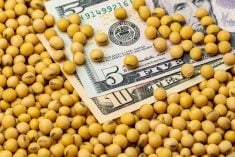Prices for dried distillers grains with solubles (DDGS) have come down significantly over the past few weeks, but the cost of bringing the product into Canadian feed rations is still too high compared to domestic options, according to a feed grains broker.
"Prices are dropping, but they haven’t dropped significantly enough to attract Canadian buyers," said Ryan Slozka, senior commodity trader with B.C.-based Rycom Trading Ltd., a major importer of U.S. DDGS, a byproduct of ethanol production.
The price, he said, has gone down by about $20 per tonne over the past few weeks, with DDGS delivered into Lethbridge currently priced at about $325 per tonne. That compares with barley at $280 per tonne.
Read Also

U.S. grains: Soy futures set 15-month high after China agrees to purchases
U.S. soybean futures reached a 15-month high on Thursday after President Donald Trump’s administration said top-importer China agreed to buy tens of millions of tons of American crops in the next few years as part of a trade truce.
Feeders will usually pay up to 20 per cent more for DDGS over barley, which means current prices at 16 per cent above barley should work, said Slozka.
However, livestock feeders are already sitting on full bins of barley, which were bought for $260 per tonne at harvest time. As a result, he expected the feeders would let their barley supplies draw down before pulling in more DDGS.
"If you think barley will go up in January/February/March, you should buy your DDGS now," said Slozka. However, most end-users are still buying on a hand-to-mouth basis and are reluctant to do much forward pricing.
While the ethanol plants are desperate to make some nearby sales now, they are also not interested in booking losses into the future. With buyers and sellers both reluctant to make a move in the current market, time will tell how many DDGS make their way into Canada this year.
"I’m optimistic that there will be DDGS coming back into Canada at some time," said Slozka, adding that livestock feeders will need to pick their opportunities going forward.
Manitoba livestock feeders have also shown good demand for U.S. DDGS in the past. However, Slozka said, the province had a good corn crop of its own this year.
As long as it’s cheaper to feed domestically grown corn, he expected DDGS would remain shut out of the Manitoba market.
— Phil Franz-Warkentin writes for Commodity News Service Canada, a Winnipeg company specializing in grain and commodity market reporting.











